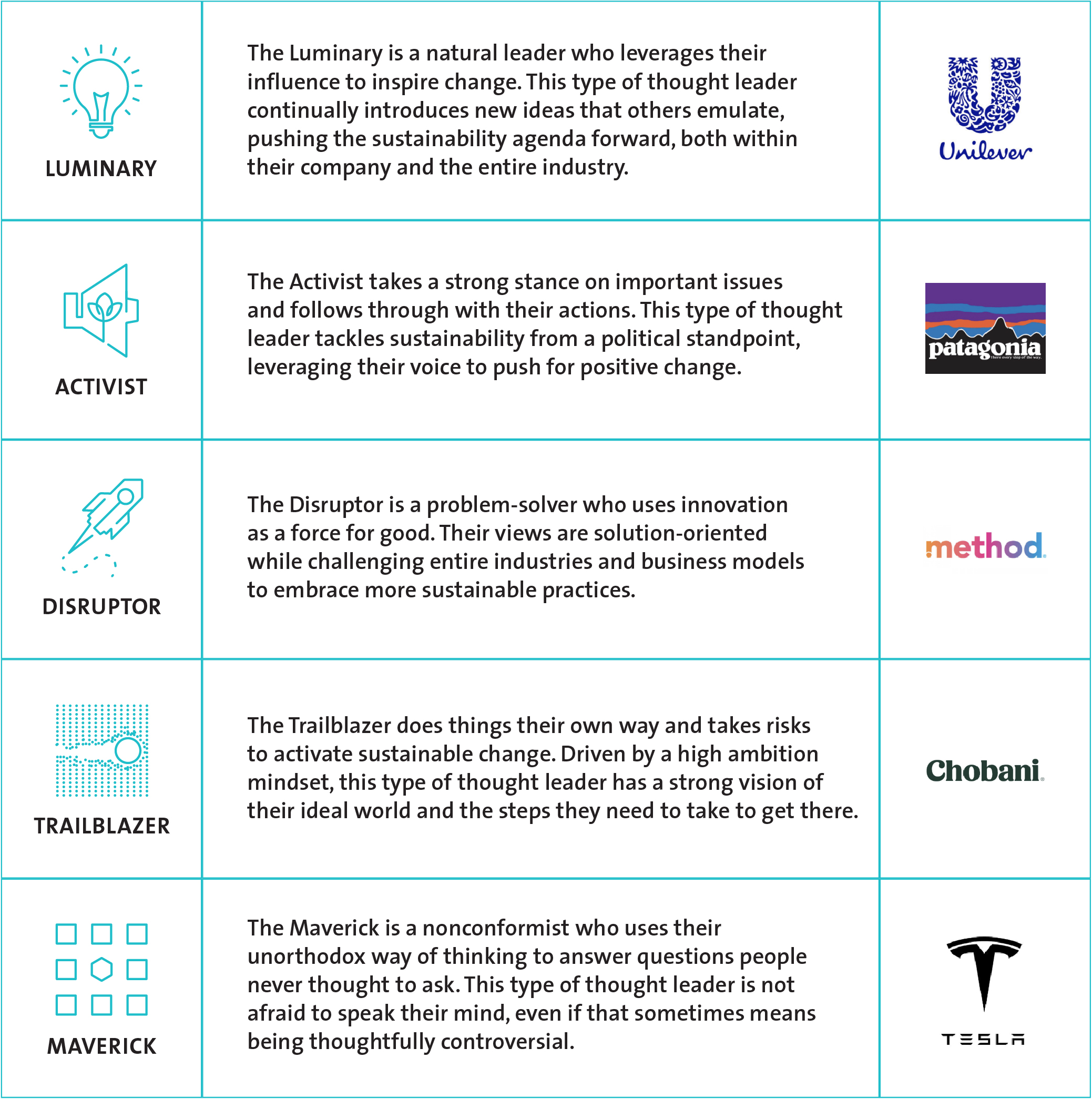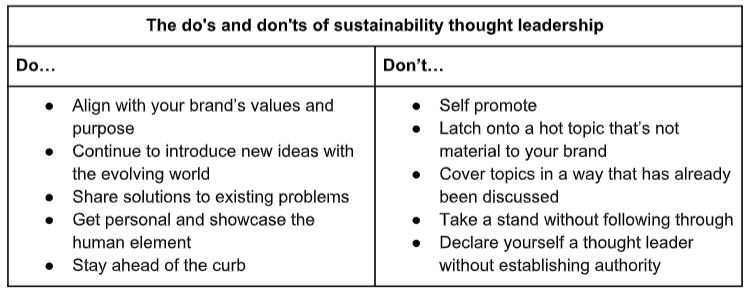Thought leadership isn’t just another buzzword. According to LinkedIn and
Edelman,
more than 60 percent of C-suite executives said they were more willing to pay a
premium to companies that create thought leadership with a clear vision, and 55
percent of business decision-makers said they increased spending with an
organization based on its thought leadership. Additionally,
LinkedIn
reports that 83 percent of consumers say thought leadership creates confidence
in brands.
Thought leadership can be defined as a communication platform that showcases
your brand’s expertise and forward-thinking ideas. Unlike content marketing,
thought leadership delivers value to stakeholders without being
self-promotional. Because thought leadership lacks the self-serving
undercurrents associated with all other types of marketing communications, it’s
one of the most effective tools for building trust among stakeholders while
establishing your brand as an industry authority.
In the sustainability space, thought leadership is especially powerful because
it can lead to more than just increased trust and credibility. While
sustainability communication tactics such as
ESG
reports, videos and social media are focused on telling your brand’s story,
thought leadership taps into a broader conversation, reaching far beyond your
brand to drive transformational change. In the ever-evolving continuum of
sustainability, thought leaders can create a movement, reinvent an industry, and
play an integral role in solving the world’s most pressing challenges. Think
back to 1994, when the sustainability guru John Elkington coined the term
“triple bottom
line,”
launching a movement for businesses to embrace sustainability. Or what about
when Interface founder Ray
Anderson influenced the carpet industry — and subsequently all manufacturing
industries — to embrace more sustainable business practices? Sustainability
thought leadership isn’t just good for PR and marketing — it’s good for the
world.
Beginning the journey to sustainability thought leadership
A thought leadership program is best suited for brands with a firmly
established, mature sustainability strategy, rather than brands that are just
getting started. If you are confident in your approach to sustainability, you
can begin exploring thought leadership opportunities by taking inventory of
where your company is already leading. Can you contribute unique insights
surrounding a sustainability topic that matters to your stakeholders? Are these
insights unique and relevant to your brand? Do you have a leader who can give
voice to your opinions? By honing in on what you know, where you’re headed and
what change you want to drive, you can begin identifying storylines and topics
for which you’re naturally positioned to take a lead. Ask yourself: What are
your disruptive ideas that can spark a conversation — or better yet, a movement?
Choosing a champion
Companies recognized as thought leaders in the sustainability space almost
always have a spokesperson who serves as the face of their storytelling. This
person must be influential, articulate and an established expert on the
sustainability topic at hand. While C-suite executives typically have the
greatest clout, anyone can become a sustainability thought leader within an
organization if they possess the following traits:
-
Passion. Great thought leaders are deeply excited about the story
they’re telling. When this genuine enthusiasm shines through, people take
note and listen.
-
Distinct point of view. In addition to being established experts,
thought leaders must possess clear, well-informed opinions that are entirely
their own.
-
Commitment. Becoming an authority on a topic takes time. Thought leaders
must continually demonstrate their expertise and ability to gauge what the
future
holds.
-
Guts. True sustainability thought leaders have the courage to lead. They
aren’t afraid to take risks or stand up for what they
believe.
Five personas of sustainability thought leaders
From challenging political legislation to disrupting an industry, your
spokesperson can approach thought leadership from a number of different angles.
Let’s explore the five different personas of sustainability thought leaders.

Growing your sustainability thought leadership program
Once you’ve identified your point of view, spokesperson and thought leadership
persona, the next step is to produce a steady drumbeat of thought leadership
content that ladders up to an overarching focus. Begin with digital pieces such
as blog posts, white papers and LinkedIn articles, paying careful attention to
discuss ideas rather than promote your business. When relevant, tap into timely
events by contributing a unique point of view. Engage with relevant journalists
as an expert source — not a PR person looking for press — to build mutually
beneficial rapport. In the early stages, negotiate sponsored content in lieu of
earned media.
Once you begin to build credibility, pursue speakerships at relevant events and
conferences, ensuring that you always bring a unique perspective to the table.
Consider leading conversations by hosting your own event, panel, or webinar. At
the same time, focus on building your spokespersons’ personal brand so that you
can leverage his or her influence for interviews, media outreach, and speaking
engagements.
As with all communications, the key to effective thought leadership is quality
over quantity. Whether digital or in person, all efforts should be timely,
relevant, authentic, and most importantly, framed through a unique point of
view. If you are not contributing an exclusive angle, it’s not truly thought
leadership.

Driving positive change
Good sustainability thought leaders introduce new ideas, but great ones change
the world. Get inspired by these leaders who have advanced the sustainability
agenda through transformational thought leadership.
Luminary: Paul Polman, Unilever
As the former CEO of Unilever,
Paul
Polman
embedded sustainability within the multibillion-dollar corporation while pushing
for other companies in the consumer goods sector to do the same. Before retiring
earlier this year, Polman shifted the entire industry by proving that “we cannot
choose between growth and sustainability — we must have both.”
Activist: Rose Mercario, Patagonia
Recognized as one of Business Insider’s 100 People Transforming Business,
Patagonia CEO Rose Marcario doesn’t just make bold political statements,
she takes action. From having Patagonia sue the current
administration
to launching the nonpartisan Time to Vote initiative, Marcario believes that
“business has to pick up the mantle when the government fails.”
Trailblazer: Hamdi Ulukaya, Chobani
Unlike most CEOs, Chobani founder Hamdi
Ulukaya
doesn’t focus on maximizing profits for shareholders. Instead, he leverages his
business to lift up communities, making personal sacrifices to “stand shoulder
to shoulder with employees.” Ulukaya gives his employees a financial stake in
the company and employs 30 percent immigrants. In doing so, he inspires “a new
way of business, a new way of working, a new way of innovation.”
Disruptors: Eric Ryan and Adam Lowry, Method
Method co-founders Eric Ryan and Adam Lowry disrupted an entire
industry by creating environmentally friendly home cleaning products that
catapulted the company into a multimillion-dollar brand. By sharing their
secrets to success in the The Method
Method,
the co-founders inspired other companies to embrace a disruptive mindset. While
this level of transparency seems risky, Ryan has stated that “if you give away
your ideas, it forces you to go out and get new ones.”
Maverick: Elon Musk, Tesla
Charismatic and occasionally controversial, Tesla’s founder and CEO is
driven by the goal of “advancing humanity and consequently changing the world.”
From making electric vehicles
sexy
to pioneering the possibility of life on Mars, Musk seeks solutions to our
world’s most pressing issues while proving that no idea is too big.
Sustainability thought leaders walk the talk
Thought leadership is more than just words. When done right, thought leadership
challenges your brand to think ahead, continuously innovate and embed
sustainability in all that you do. But no matter which approach you take on your
thought leadership journey, your words must be rooted in genuine intent that
leads to action. This is what puts the “leader” in thought leadership.
Get the latest insights, trends, and innovations to help position yourself at the forefront of sustainable business leadership—delivered straight to your inbox.
Shannon is a wordsmith, storyteller and PR/social media pro at ThinkPARALLAX, driven by the desire to make a positive impact on the planet.
Published Oct 17, 2019 2pm EDT / 11am PDT / 7pm BST / 8pm CEST